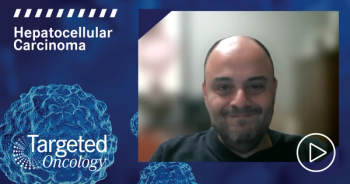
Reviewing Lenvatinib Data for Treatment in mHCC
Catherine Frenette, MD:The REFLECT trial was the phase III open-label trial of lenvatinib [Lenvima] versus sorafenib [Nexavar] for front-line therapy of advanced HCCeither metastatic disease or vascular invasion. It enrolled patients with good performance status, an ECOG [Eastern Cooperative Oncology Group] score of 0 to 2, and good Child-Pugh status—meaning Child-Pugh A—into an open-label randomization of lenvatinib or sorafenib. It was powered as a noninferiority trial with secondary endpoints of overall response rates [ORRs], overall survival [OS], and progression-free survival [PFS].
This was a positive trial, meaning the lenvatinib was proven to be noninferior to sorafenib as far as OS, which, in patients in the lenvatinib group, was 13.6 months and, in the sorafenib, 12.3 months, with a hazard ratio of 0.92. Statistically, these 2 therapies were equivalent or noninferior for the OS with these patients. It’s important to realize that the sorafenib group did have a longer OS compared with, say, the SHARP trial or the Asia-Pacific trial, at which sorafenib was initially approved as a first-line therapy. The inclusion criteria for the RELFECT trial was very different: patients who had main portal vein invasion were excluded from the trial. They also excluded patients that had a tumor burden of greater than 50% in the liver. This means that patients with advanced liver cancer were excluded from the REFLECT trial, which accounts for the OS being potentially longer compared with registration trials. It is also important to understand that, even though the OS was the same, lenvatinib was shown to have a better ORR compared with sorafenib.
So lenvatinib’s overall response rate was 24.1% compared with sorafenib, for which the overall response rate was 9%. This was modified by the RECIST criteria, which is the criteria that we use generally for patients with liver cancer, as opposed to other cancers, which use the RECIST 1.1. The progression-free survival and time to progression was also better with lenvatinib as compared with sorafenib. So lenvatinib’s progression-free survival was 7.4 months compared with sorafenib, for which it was 3.7, and the time to progression was 8.9 months compared with 3.7 months. And these were both statistically significant. So overall survival was equivalent. However, response rates, progression-free survival, and time to progression all were better with lenvatinib.
The REFLECT trial then led to FDA approval for lenvatinib for first-line treatment of advanced HCC, a change in the standard of care that has existed for the past 10 years. Lenvatinib is a good option for patients who again are symptomatic or need stabilization for longer periods of time. There’s also some discussion that potentially, with the ORR of lenvatinib, that patients will benefit with tumor shrinkage to the point where they may be able to undergo local regional therapy or surgical treatments.
We have to remember that lenvatinib did have more hypertension side effects than sorafenib, in the REFLECT trial, and that patients who already have poorly controlled hypertension may have cause to use sorafenib over lenvatinib. But that’s the only exception.
In the REFLECT trial, the sorafenib-treated patients did have a longer OS of 12.3 months compared with what we expected from the SHARP trial, which was 10.7 months. This is probably because the patients in the REFELCT trial, again, were not allowed to have a main portal vein invasion in addition to not being allowed to have more than 50% of their liver involved. These 2 criteria were not part of the inclusion criteria for the SHARP trial. The patients with SHARP actually exhibited more advanced liver cancer, which perhaps caused the change in the median survival between those 2 trials.
Transcript edited for clarity.
A 77-Year-Old Male With Unresectable HCC and Extrahepatic Involvement
- History and physical exam
- An otherwise healthy, 77-year-old Caucasian male with a history of alcohol use
- Presented to his PCP complaining of abdominal pain, fatigue and an unexplained 10-lb weight loss
- Currently consumes 3-4 alcoholic drinks per day
- ECOG PS 0
- Imaging
- CT scan: 4.5-cm hepatic lesion with arterial hypervascularity, portal venous washout, and a pseudocapsule indicative of hepatocellular carcinoma; no evidence of vascular invasion
- Bone scan: left-sided iliac mass (3.1 cm)
- Chest CT: clear
- Diagnosis: unresectable HCC with extrahepatic involvement
- BCLC stage C
- Child-Pugh A
- AFP Level: 3548.4 ng/mL
- Weight: 72 kg
- Lenvatinib 12 mg QD was initiated.
- He experienced modest weight loss and reported loss of appetite for which he was referred for nutritional therapy
- Imaging at 16 weeks: partial response (0.5 cm)
- 8 months after initiation of therapy: treatment discontinued due to disease progression








































